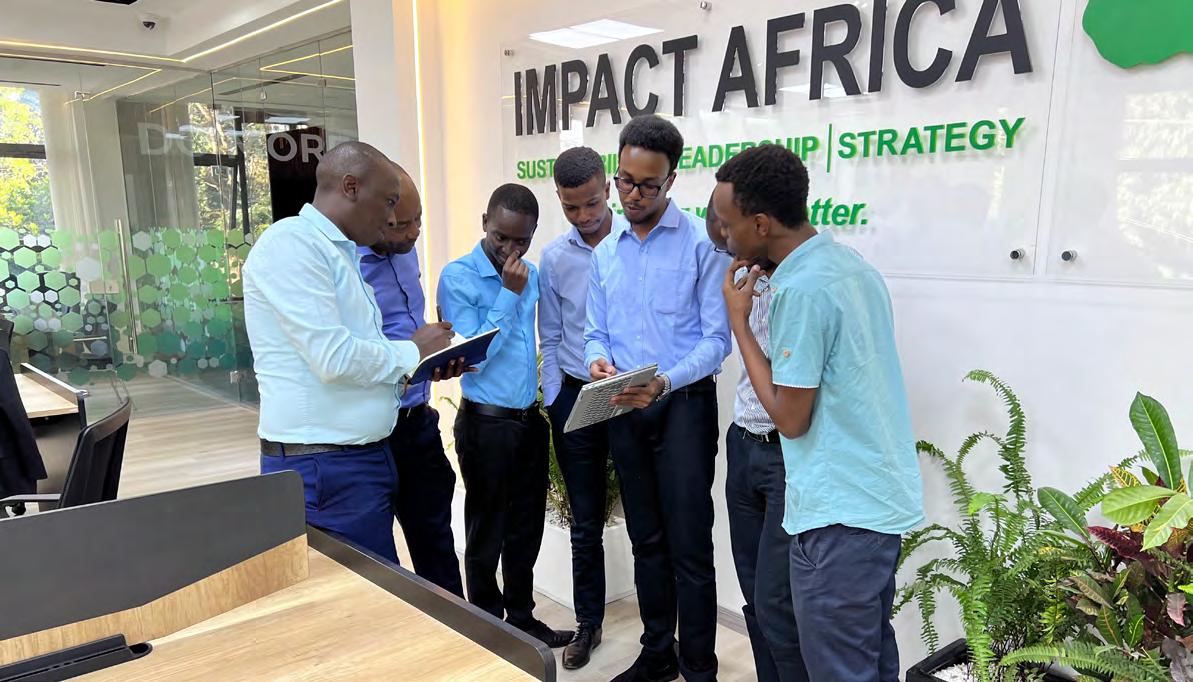
3 minute read
MITI ALLIANCE:
Youth in Climate Action
In the battle against climate change, youth hold the key to a sustainable future. Harnessing the passion, innovation, and determination of the youth is both a choice and a necessity in addressing the pressing challenges of our time.
Advertisement

Miti Alliance involvement in climate action is not merely symbolic; it is a powerful force driving real change and shaping a world where environmental stewardship is ingrained in every decision and action. Waiyaki Nganga through the Miti Alliance, developed a method to educate both older and younger generations extensively on climate action, a subject they had not previously been exposed to. This organisation, based in Kenya, is aimed at ensuring that the younger generation possesses the necessary knowledge and skills to be enthusiastic about climate change and actively engage in addressing it.

Miti Alliance is a registered social enterprise in Kenya dedicated to environmental education by empowering and preparing both the present and future cohorts of conservationists. The Miti Schools Program is centred on empowering and preparing students in schools with comprehensive knowledge, skills, and awareness of climate change matters, particularly focusing on the cultivation and nurturing of trees, specifically fruit and native species. The name is derived and linked to the organisation’s mission of mitigating climate change by forming positive mindsets towards the environment. The Alliance works to empower communities through environmental education and the promotion of green livelihoods.
The organisation ofers consulting and managerial support for tree cultivation initiatives and actively promotes environmental conservation and rejuvenation through their communication platforms. Additionally, they oversee an indigenous tree nursery and operate two training facilities aimed at educating individuals on tree cultivation, conservation practices, and sustainable approaches.
The Miti Alliance School Program, under which 250 schools across 14 villages in Kenya have participated, has come a long way in chartering a path for learning about the impact of climate change. The first course Waiyaki took after High School was accounts, but being a Rotaractor and Global Shaper, he was exposed to climate action. When he was involved in a research endeavour about the use of solar lamps in Kenya by Global Shapers Nairobi, and Global Shapers Rome in collaboration with Givewatts, a solar energy company in Kenya. He travelled across Kenya and understood the potential that solar lamps had to improve the lives of rural residents. With his knowledge in this area, he was ofered a job at Givewatts.
At Givewatts, Waiyaki rose through the ranks quickly to become the country manager for the company which grew and expanded to Tanzania. He had found work that resonated with his passion and by the time he left Givewatts 4 years later, they had changed the story of lighting in many rural areas in Kenya and Tanzania. He had established operations with a complement of 44 members of staf, 22 in Kenya and 22 in Tanzania.
Miti Alliance was founded by Waiyaki in 2018, and when first founded his vision was to plant 5 million trees by 2025, but the project started to stall at about 180,000 trees. A monitoring and evaluation exercise revealed that approximately 50% of the trees were dying. In the quest to understand the hindrance, it was discovered that the main challenges were water and space. Waiyaki and his team knew they needed to run substantive programs, focusing first on equipping the people who were going to participate in tree planting and growing.

When they changed the strategy, there was increased success, and mostly in schools. “Schools have a high population, they have space, and having done many projects with adults, we had learned that it was hard to get older people to keep up with the care needed for growing trees,” Waiyaki explains, and continues, “Many adults were not driven enough to make a diference.” Children gave Miti Alliance a diferent experience. Once they were equipped with the right information, they were passionate about the course. Therefore, working with children gave Waiyaki a fighting chance at achieving his goal of ofering transformational, informative, and long-term solutions to the issues of climate change.
To minimise the chances for such wastage and disappointment, Waiyaki and his team conducted a thorough interview and baseline survey with the school management before engaging them, just to ensure that the tree planting would not be done to check a box. The genuine intention of the management to get into a sustainable tree planting program is crucial in the impartation of the learners with values of climate action. This as Waiyaki points out, has helped them get into fruitful partnerships with corporations, individuals, or organisations. With the schools’ program, Waiyaki is hopeful that they will have planted and maintained 5 million trees by 2025, contributing significantly to increasing Kenya’s forest cover and reversing some of the adverse efects that the nation is experiencing because of deforestation.

As we navigate the complex web of environmental crises, one thing remains clear: the active participation of the youth in climate action is not just a hopeful aspiration but a pragmatic necessity. Their voices, actions, and unwavering commitment are the seeds of a greener, more sustainable future. Empowering and supporting the youth in their endeavours to combat climate change, secures a better tomorrow but also ensure that the legacy left behind is one of resilience, responsibility, and reverence for our planet. With the youth at the forefront, a path can be forged towards a brighter, more sustainable future for generations to come.










